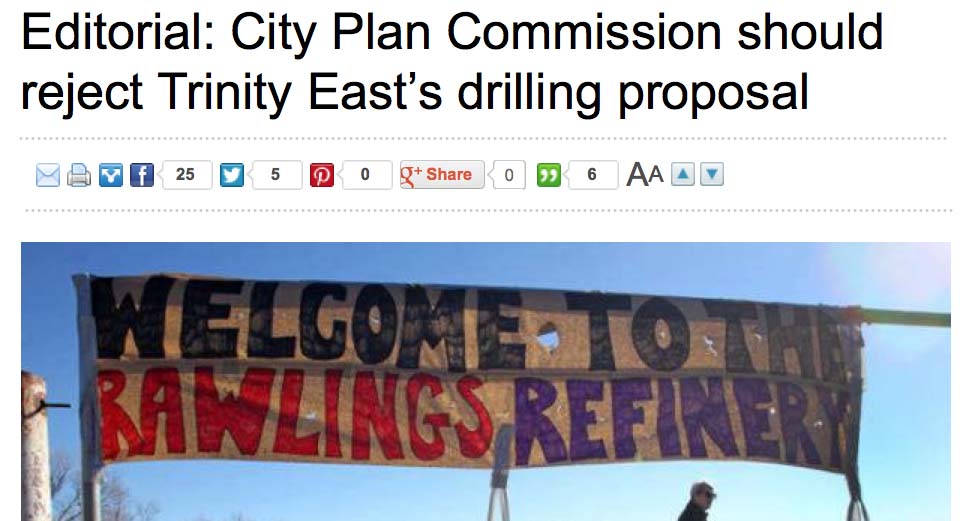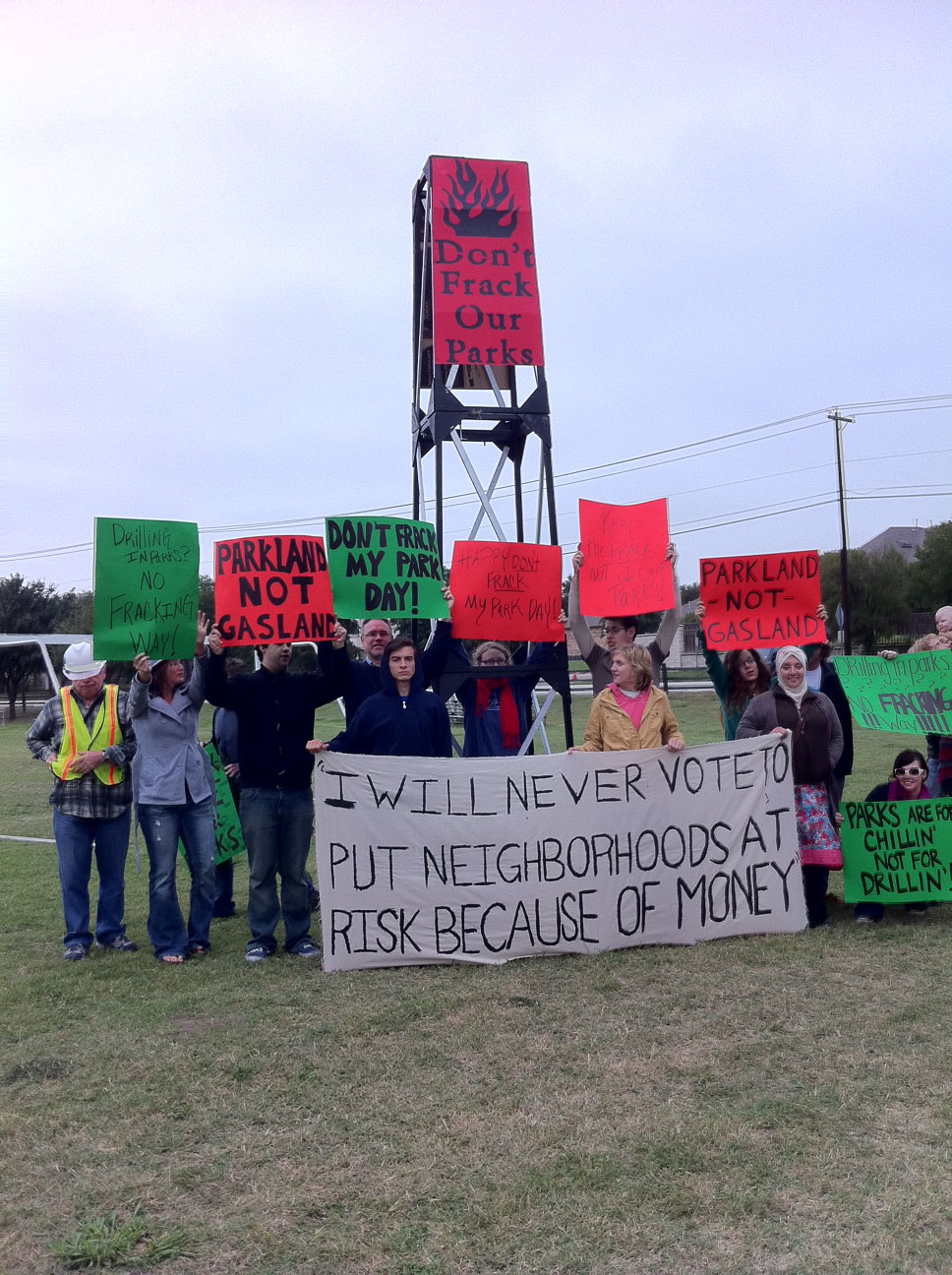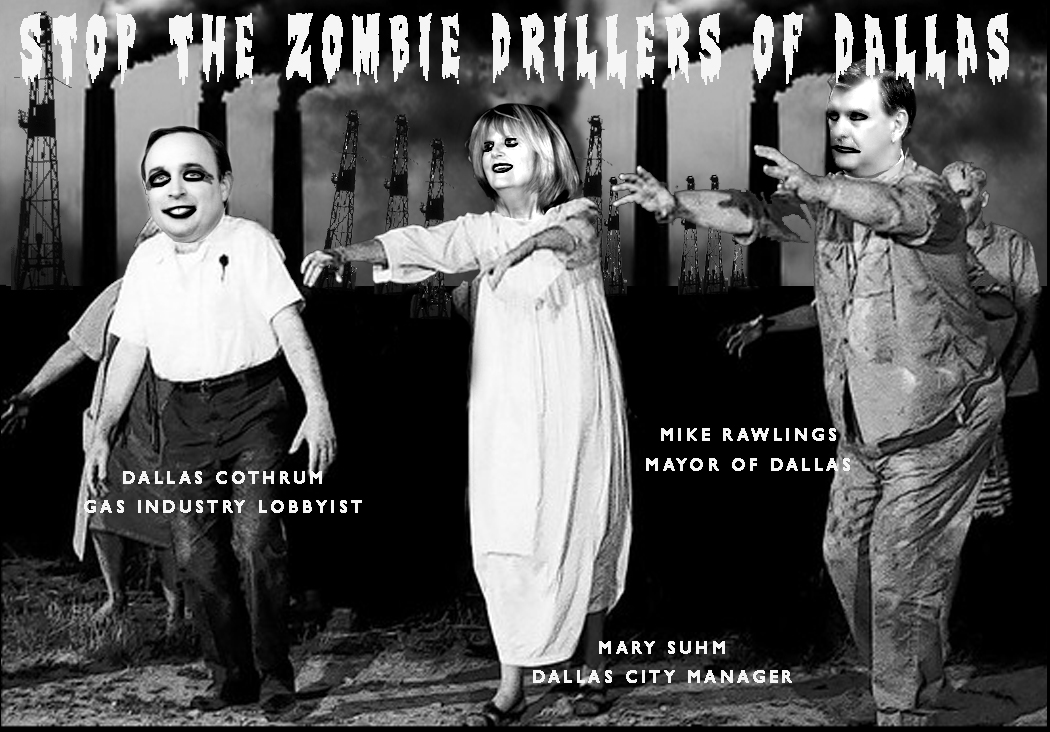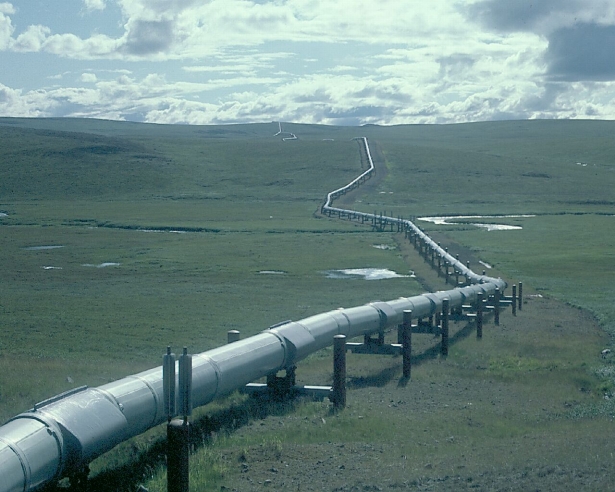Archive for March 2013
Dallas Morning News Says Enough is Enough: Deny Gas Permits
 Win, lose or draw at Thursday's City Plan Commission vote, there is no question that, slowly, but surely, residents have built a consensus of public opposition to the Trinity East permits. For the latest proof, look no further than Wednesday's lead editorial in the Dallas Morning News advocating denial. It's the first time the paper has taken such a position. We know some of you can't get over the DMN paywall, so as a public service, here's the whole peice.
Win, lose or draw at Thursday's City Plan Commission vote, there is no question that, slowly, but surely, residents have built a consensus of public opposition to the Trinity East permits. For the latest proof, look no further than Wednesday's lead editorial in the Dallas Morning News advocating denial. It's the first time the paper has taken such a position. We know some of you can't get over the DMN paywall, so as a public service, here's the whole peice.
DMN Writer Opposes Gas Permits, Irving Meeting Opens Up New Front
 Two things happened last night in regards to the Dallas Drilling Scandal and how it plays out this week in front of the City Plan Commission for a second, "reconsidered" vote On Thursday.
Two things happened last night in regards to the Dallas Drilling Scandal and how it plays out this week in front of the City Plan Commission for a second, "reconsidered" vote On Thursday.
Sharon Grigsby, a long-time member of the of the Dallas Morning News editorial staff, took to the paper's online opinion pages and offered up a critique of why she'd vote to deny Trinity East their gas permits,
Here’s my list of why our newspaper should say no to the Trinity East plan.
1. City ordinance prohibits surface drilling in parkland because the city has determined that open spaces are environmentally important and a necessary component. All too often, the city’s history has been to under-invest in open spaces or to compromise them when a deal came along.
2. The fact that City Manager Mary Suhm told the council “no drilling in parkland” while in the same time period signing a letter saying she’d help Trinity East push forward on the parkland drilling plan may not bother the city council, but it makes for a sketchy deal.
3. If #2 isn’t taint enough, the fact that a coveted piece of parkland mysteriously showed up in the final lease further taints the deal.
4. As Trinity East’s plans rolled out to the Plan Commission, we learned of a number of environmental question marks. The one that is the most troublesome involves emissions from the proposed gas processing unit. The only thing that’s clear regarding these emissions is that no answers will be forthcoming anytime soon. Given all the fog that has pervaded this deal since December, the city’s credibility is not good — and makes it difficult to just turn our back on environmental questions.
5. Finally, the city has cited the large youth soccer fields (under development) as a reason NOT to approve other heavy industrial uses in the area. Thus, we have pause about the gas-processing unit being located so close to the fields. The city and Trinity East likely would argue that the drilling operation is different from the uses that have been denied. However, given the items in #2 and #3 above, it’s hard to trust City Hall on this deal.
6. I’m just left feeling completely squishy that so little was known about the Trinity East plan until just a couple of months ago, when documents began leaking out. The fact is that Trinity East had never really given much detail — and the city seemed just fine with that.
We'll see if her colleagues have the same common sense Ms. Grigsby has in the next 48 hours, when the paper is expected to take its latest position. To its credit, the DMN is asking very pointed questions about the Drilling Scandal and City Manager Mary Suhm in its City Council questionnaire.
Also last night – for the first time, Irving residents met to speak up about their displeasure in being downwind of all three Dallas gas sites, including the large refinery/compressor station that will become Dallas' 10th largest air polluter the moment it comes online. Approximately 60 people showed up at a hastily called City of Irving town hall meeting at the North Hills Prep School on Royal Lane hosted by Irving City Council Rose Cannaday.
There was a unanimous opposition to the permits and many participants said they were planning to attend up at Thursday's City Plan Commission meeting at Dallas City Hall to voice their concerns. North Hills Prep is directly northwest, from all three sites, and more than once, parents said they planned to get more involved. Residents urged the Irving City Council to take an official stand against the permits, as well as recruit their state elected officials to help.
So, expect a load of angry Irving residents on Thursday. Won't you come and join them? 1:00 pm, 6th Floor, Dallas City Hall. We need you there.
Groups Call for Full Open Public Hearing for Dallas Gas Permits Vote on Thursday
 Here's the full text of a letter that was sent to all Dallas City Plan Commission members last week:
Here's the full text of a letter that was sent to all Dallas City Plan Commission members last week:
Commissioners and Chair,
Despite the request to the City Council made by members of the Commission on February 7th to change city policy in order to accommodate the Trinity East gas permits by your March 21st meeting, there has been no effort to do so.
For this reason alone, we urge you to take no action on these permits next week, or uphold your December 20th denial. These permits would allow surface drilling on park land and in floodplains, contrary to current city policy.
However, information and circumstances that have come to light since the December 20th vote to deny these permits make them even more objectionable.
We know that the proposed Trinity East processing facility and compressor station will be at least the 10th largest source of air pollution in the city, with a strong probability that emissions would grow to be much greater, out of the regulatory reach of the City of Dallas as they grow.
We know that city staff is working to locate this large air polluter next to the new Elm Fork Athletic Complex, in direct contradiction to recent city staff and City Council actions to protect the area around the Complex from lesser air pollution threats.
We know that, despite the title of the facility itself, the scale of operations, and the equipment it proposes to install, city staff refuses to classify Trinity East’s “Luna South Gas Processing Facility” as a gas processing facility under current City of Dallas zoning law.
We know that Trinity East misled the CPC at your February 7th meeting when its representative told you that gas well casings always protect underground aquifers. In fact, Trinity East had a casing failure at a previously undisclosed well in Irving, only a few miles away from the proposed Dallas sites, and with the City of Dallas participating in the lease agreement.
We know that on January 10th, Trinity East representatives told the Commission that its processing facility and compressor station would handle only the gas from its three Dallas sites—despite its Manager stating in published interviews that it was the centerpiece of a larger regional plan that incorporated Trinity East wells in at least two other cities.
We know that the city staff has a conflict of interest in performing an unbiased due diligence of the Trinity East permits because the City Manager had already pledged to support approval of the permits in a previously-undisclosed 2008 agreement. This is the reason there has not been a comprehensive review of the environmental and public health impacts of these permits by the City of Dallas staff, as there have been for other proposed polluting facilities in the same area as the Trinity East sites.
We know that a complaint has been filed with the Dallas County District Attorney’s Office alleging possible Open Meetings Act violations leading up to the January 10th CPC meeting that could make a second, “reconsidered” vote on the Trinity East permits illegal.
We know that a vote to approve these Trinity East permits is a vote condoning five years of the public, the Commission, the Park Board, and the City Council being intentionally mislead by the City Manager concerning the circumstances of these specific sites. It is perhaps the most important vote you will cast as a City of Dallas Plan Commissioner.
If you do decide to take a second vote on the Trinity East permits at your March 21st meeting, we request that you adopt special public hearing procedures that will guarantee a Dallas resident’s right to speak.
Based on the experience of the Commission’s February 7th meeting, the CPC format of 15-minutes per-side is clearly not adequate to allow everyone who wishes to give testimony on this high profile and controversial issue to be heard.
Because the CPC only meets during weekdays, many of us take off from our jobs or home responsibilities to attend. Our time should be respected. When a government entity announces a public hearing, it should be willing to listen to everyone who makes the effort to attend and speak. You owe us that courtesy.
The only time citizens have become angry during CPC meetings has been when they were completely shut-out of any opportunity to provide public comment (January 10th), and when public comment was shut down prematurely with many dozens of speakers still lined up to give testimony (February 7th). We make no apology in standing up for our right to speak out.
To avoid future frustrations, any definitive vote on the Trinity East permits taken on March 21st should be preceded by an inclusive, open-ended public hearing that gives each person their say. Toward that end, we propose that the CPC adopt the City Council rules for public hearing and allow everyone who wants to testify a total of 3 minutes each. The hearing would remain open until the last person spoke. Commission members would still be able to ask questions of specific presenters. This offers freedom of speech without sacrificing any of your tools to elicit further information from the participants.
We know that some of you must be as frustrated as ourselves in having to revisit this issue time and again, but there is a way to definitely put it to rest. Let the December 20th denial of the Trinity East permits stand.
Thank you for your consideration.
Raymond Crawford
Dallas Area Residents for Responsible Drilling
Jim Schermbeck
Downwinders at Risk
Sharon Wilson
Earthworks’ Oil & Gas Accountability Project
Marc McCord
FracDallas
Ed Meyer
Mountain Creek Neighborhood Alliance
Molly Rooke
Greater Dallas Chapter, Sierra Club
Zac Trahan
Texas Campaign for the Environment
The Obama Administration Gives and Takes on Climate Change Regs
 First the good news. In looking for non-legislative ways to combat global warming, the Obama Administration has apparently decided to use Nixon-era requirements originally meant to force federal agencies to evaluate their impacts on soil, water and air pollution, to now include climate effects. According to this Bloomberg piece, industry isn't taking the news very well:
First the good news. In looking for non-legislative ways to combat global warming, the Obama Administration has apparently decided to use Nixon-era requirements originally meant to force federal agencies to evaluate their impacts on soil, water and air pollution, to now include climate effects. According to this Bloomberg piece, industry isn't taking the news very well:
“It’s got us very freaked out,” said Ross Eisenberg, vice president of the National Association of Manufacturers, a Washington-based group that represents 11,000 companies such as Exxon Mobil Corp. (XOM) and Southern Co. (SO) The standards, which constitute guidance for agencies and not new regulations, are set to be issued in the coming weeks, according to lawyers briefed by administration officials.
Any federal permit or regulated activity, not just administered by the EPA, but any federal department, including the Army Corp of Engineers, the Armed Forces, the Veterans Administration, the Energy Department and so on, would be affected. Full life-cycle environmental impacts would have to take into account the project's or permitted activity's impact on climate change. This could mean delays for projects ranging from the Keystone Pipeline to new Liquefied Natural Gas export facilities on the Texas coast.
The little-known White House Council on Environmental Quality is expected to issue the new standards within weeks, which derive their authority from the 1970 National Environmental Policy Act.
The new standards will be “a major shakeup in how agencies conduct NEPA” reviews, said Brendan Cummings, senior counsel for the Center for Biological Diversity in San Francisco.
The White House is looking at requiring consideration of both the increase in greenhouse gases and a project’s vulnerability to flooding, drought or other extreme weather that might result from global warming, according to an initial proposal it issued in 2010. Those full reports would be required for projects with 25,000 metric tons of carbon dioxide equivalent emissions or more per year, the equivalent of burning about 100 rail cars of coal.
Such a strategy would allow the Administration to avoid canceling any projects outright. Rather it would probably force the most contentious ones into court where it would be a battle of attrition. But it would introduce climate change as a legitimate yardstick for assessing uniform federal compliance with the law.
What the Administration giveth, it taketh away. Most followers expected the first major action on climate change after the 2012 election to be new greenhouse regulations for power plants. They've been widely anticipated by environmentalists for months as one of the most profound ways to affect rising greenhouse gas emissions – 40% of the nation's CO2 comes from power plants. But now there's trouble:
Last year, the EPA proposed the first-ever greenhouse gas standard for new power plants, which would require any new power plant to emit no more than 1,000 pounds of carbon dioxide per megawatt hour of electricity produced. The agency is supposed to finalize the rule by April 13 but is likely to miss that deadline, and officials are discussing with the White House how they might modify the proposal in order to ensure it can survive a legal challenge.
It seems lawyers are recommending separating the standard out into two categories – one for coal-fired power plants and one for gas plants – to better protect against lawsuit threats that claim the tough emission limits are impossible for any coal plant to meet. But doing so will indefinitely delay the limits and that will likely cause environmental groups to sue once the EPA misses the April 13th deadline.
David Doniger, a senior attorney at the Natural Resources Defense Council and director of the group’s climate and clean air program, said the key question for environmental advocates is how long the administration would postpone the rule.
“It’s critical to get this standard out without delay and get onto the standards for existing sources,” Doniger said. “The deadline is coming, and if the deadline isn’t met they should expect groups like ours will take legal action to meet their responsibility.”
News of any delay will likely follow the announcement of the NEPA standards going into effect so the sting isn't quit so acute. Stay tuned.
Come and Put a Stake Through the Heart of a Scandal: Dallas Drilling Vote Scheduled Next Thursday, 21st
 Today the Dallas city secretary's office published the agenda for next Thursday's City Plan Commission meeting. It includes a vote on the three controversial Trinity East gas drilling and production sites – the Luna Vista/LB Houston golf course site on park land and in the Trinity River flood plain, the Gun Club site on park land and in the flood plain, and the large refinery and compressor station near the Elm Fork Athletic Complex.
Today the Dallas city secretary's office published the agenda for next Thursday's City Plan Commission meeting. It includes a vote on the three controversial Trinity East gas drilling and production sites – the Luna Vista/LB Houston golf course site on park land and in the Trinity River flood plain, the Gun Club site on park land and in the flood plain, and the large refinery and compressor station near the Elm Fork Athletic Complex.
Opponents will once again be gathering at 1pm next Thursday, March 21st, on the 6th floor of Dallas City Hall to hold a press conference immediately before the start of the CPC meeting.
This March vote was scheduled after the short-circuited February 7th Commission hearing, when members of the CPC requested that the City Council take action to change city policy to make the permits legal – that is, to allow drilling in park land and the flood plain. However, the Council hasn't taken any action on these items. Drilling in parks and in the flood plain is still against city policy and so, these permits are still illegal. Voting for their approval would be a disastrous precedent. But the vote will be very close. That's why we need you there again next Thursday.
Many of you have seen how members of the Dallas City Council responded to this Drilling Scandal when an unprecedented cross-examination of the City Manager took place at a late February Council meeting – most rolled up into a ball and wanted the whole thing to go away, others were anxious to get on with drilling. Only three Council members spoke out against the last five years of secret agreements, lies and misrepresentation about these permits by city staff.
That's why these Trinity East permits must be stopped at the Plan Commission. If the CPC votes to deny the permits this next Thursday, that will probably be the end of things because it would take 12 votes to overturn that decision at the Council. We have the four votes necessary to prevent that from happening. If the CPC votes to approve, all it will take to issue these permits are 8 Council votes to drill, baby drill, and believe us, they have those votes. So the CPC is it.
We need your butt in a chair in the City Council Chamber at 1:30 pm next Thursday. Your presence at the last three skirmishes has kept this hot potato hot. Please don't let it cool down now, when the climatic vote is taking place. Make a commitment to show up one more time. It's important or we wouldn't ask.
To help you get ready for next Thursday, here's some helpful study aids:
* If you want a quick visual tour of these three Trinity East sites and a good summary of the fight, please check out our 4 minute video primer:
https://www.downwindersatrisk.org/2013/03/dallas-fracking-mystery-tour/
* In Friday's Dallas Morning News, North Texas naturalist Julia Bergen describes why these drilling sites are anything but "wasteland," as some City Council members have described them:
http://www.dallasnews.com/opinion/latest-columns/20130314-julia-burgen-plant-trees-not-drill-sites-in-parks.ece
* The Dallas Residents at Risk alliance has a good summary of the issues involved on the front page of their website:
http://dallasresidentsatrisk.com/
* Here's our take on the recent discovery that the City and Trinity East have already partnered-up to drill a previously-undisclosed well in Irving and the result was a casing failure that could have left thousands of gallons of chemicals underground:
All we know about these sites has come from citizens doing the due diligence that the city should have been performing. If it had not been for you showing-up five days before Christmas for the first CPC hearing, again in January for the bogus "reconsideration" vote, and again at the Commission's February abbreviated "hearing," these permits would have already been approved. There's been a human dam of residents holding back the wave of city staff and industry inertia. Don't let that dam fail now. Vote with your body. Please Be There Thursday.
Dallas Fracking Mystery Tour
State Budget Writers Vote to Keep Raiding Anti-Smog Funds
 Today brings news of the first skirmish in this year's state Legislative session over using anti-smog funds collected in DFW and other EPA "non-attainment" areas to ease budget gaps in general revenue.
Today brings news of the first skirmish in this year's state Legislative session over using anti-smog funds collected in DFW and other EPA "non-attainment" areas to ease budget gaps in general revenue.
The Dallas Morning News has an account of local Dallas State Representative Helen Giddings teaming up with Houston Rep. Turner Sylvester during a House Appropriations Committeee meeting on Tuesday to make the case that the funds are desperately needed to help reduce air pollution in Texas' largest cities where unhealthy air is still the norm during "ozone season."
Everyone who gets their car inspected in North Texas pays an extra $6 that goes to the "Low-Income Repair and Replacement Assistance Program," (LIRAP). The money is supposed to be used to help low-income car owners upgrade their vehicles so they'll run cleaner. Because they can't afford to buy new vehicles as often, low income owners usually drive older cars. Older cars are dirtier cars. Fix them or upgrade them to newer cars and you reduce air pollution.
According to the folks that wear the green shades, the LIRAP fund will have approximately $77 million in unspent money at the end of August. Another $80 million is expected to be collected in the state's "non-attainment areas" over the next two years. That's a lot of car repair money. But as it turns out, state budget writers are proposing to only spend a little over $11 million in the next two years to be split up between Houston, DFW, Austin and San Antonio.
The size of the diversion has publicly angered elected officials in DFW and the other urban areas who are facing compliance with a new, stricter EPA smog standard by 2018 even as they annually fail to meet the old standard. In DFW and Houston LIRAP funding is traditionally used to build the clean air plans that must get approved by EPA. Without sufficient funds, local officials are telling the state that its next plan, due in 2015, might not get approved by EPA. You can imagine the disappointment in Austin of hearing that news.
Austin and San Antonio officials have actually threatened to pull out of the fee system all together unless they get more back of what their residents are putting in. That huffing and puffing paid off a bit Tuesday, as the Republican-led committee voted to approve an additional, but token, $1.4 million to those cities. Still, perhaps that lesson will not be lost on DFW officials, who have a long history of suffering silently as the state increasingly robs the region of its ability to control it's own air quality fate.
This was only the opening round of votes, and the House is more conservative than the Senate. But it's probably not a good sign that Rep. Giddings was the only one of at least five DFW-based members of the House Appropriations Committee quoted in News as leading the charge. Missing in Action was former Arlington City Council member and previous sometime-clean air supporter Diane Patrick, and oh yeah, the Chair of the Committee that hails from non-attainment Ellis County, Representative Jim Pitts. If the local North Texas clean air establishment can't get more help from its own players in the Lege, they're unlikely to see more money flowing their way.
Another Study Links Autism to Air Pollution
 The more Ozone and Particulate Matter pollution a baby in the womb is exposed to, the more likely he or she will be born with autism according to a new UCLA study published March 1st in Environmental Health Perspectives, a peer-reviewed journal published by the National Institute of Environmental Health Sciences. It's the largest study of its kind to date and is the first to link autism with ozone, or smog, levels.
The more Ozone and Particulate Matter pollution a baby in the womb is exposed to, the more likely he or she will be born with autism according to a new UCLA study published March 1st in Environmental Health Perspectives, a peer-reviewed journal published by the National Institute of Environmental Health Sciences. It's the largest study of its kind to date and is the first to link autism with ozone, or smog, levels.
Researchers compared levels of air pollutants, mostly related to vehicle traffic, during pregnancy gestation periods of 7,603 children with autism and 75,635 children without autism, born from 1995 to 2006 in Los Angeles. Babies at the 75th percentile of exposure to toxins had a 8 percent to 10 percent higher risk of autism than babies at the bottom 25th percentile, the study said. Ozone and fine particulates had the strongest association with autism.
Using government air monitoring stations, researchers estimated average exposures during pregnancy to carbon monoxide, nitrogen dioxide, nitric oxide, ozone and particulate matter. The study adjusted for factors that include maternal age, birthplace, race and education. Using birth certificates, researchers compared control children with non-control children who had matching birth year, sex and gestational age at birth.
"These findings are of concern, since traffic-related air pollution is ubiquitous," said Dr. Beate Ritz, chair of UCLA's Department of Epidemiology and the study's senior author. She said she was reluctant to advise expectant mothers to leave LA or polluted cities, because that's not an option for many. "We can't tell them to not breathe or not go outside or not go to work," she said. She did recommend avoiding sitting in traffic, when pollutant exposure is worst."
Autism is a spectrum of disorders ranging from a profound inability to communicate and mental retardation to milder symptoms seen in Asperger's syndrome. The Centers for Disease Control and Prevention estimates that autism affects one in every 88 children born in the U.S., a 25 percent increase from 2006.
Research on autism and exposure to chemicals has been limited. Studies from 2006 and 2010 found an association between autism and air pollutants from industries and other sources.
A study in 2010 was the first to look at autism and toxins specifically from auto exhaust. The study, based in California, reported that children born to mothers living within 9/10 mile of a freeway during pregnancy were more likely to be diagnosed with autism than children whose mothers lived more than 1/4 mile from a freeway. However, the sample size — 304 autism cases and 259 controls — was much smaller than the just-published UCLA study.
Most policy discussions concerning air pollution in DFW surround the damage done to lungs, or maybe hearts and lungs. Rarely are the other, now well-known associations between air pollution and birth defects, or air pollution and brain function mentioned. And even rarer is the fact mentioned that these harms are often occurring at levels of pollution considered to be officially "safe" or at least legal. We really have no idea what the assault on our bodies by chemicals we involuntarily breathe actually can do to our health over the long term. That's why we should minimize exposure to them as much as possible. And that means limiting the chemicals' movements, not those of expectant moms.
Dallas Drilling Scandal Gets Its Very Own SLAPP Suit Threat
 Let's see, so far the Great Dallas Drilling Scandal™ includes illegal drilling sites, a secret agreement, secret wells….in Irving, citizen protests, allegations of Open Meetings violations, likely Open Records violations, a surprise refinery, comparisons to Christ, and at least one grassroots city council candidacy. Missing until now was it's very own SLAPP suit (Strategic Lawsuit Aimed at Public Participation).
Let's see, so far the Great Dallas Drilling Scandal™ includes illegal drilling sites, a secret agreement, secret wells….in Irving, citizen protests, allegations of Open Meetings violations, likely Open Records violations, a surprise refinery, comparisons to Christ, and at least one grassroots city council candidacy. Missing until now was it's very own SLAPP suit (Strategic Lawsuit Aimed at Public Participation).
Check.
Monday saw the announcement that lawyers for the company behind the three controversial Dallas gas permits had sent a nasty letter to one Zac Trahan of the Texas Environmental Campaign telling him to cease and desist in handing out flyers telling people that a casing failure at one of the company's wells in Irving could have harmed groundwater. Since it happened deep underground and there has been no public disclosure of post-failure testing, it's impossible to say whether it caused harm to groundwater or not. But that didn't keep Trinity East from wanting full exoneration. According to a letter from the law firm representing Trinity East,
"That statement is absolutely false. Trinity East's prior well did not contaminate any underground water aquifers. In fact, any casing failure on that well could not have caused or produced aquifer contamination because surface casing was set and cemented at required depths (per Texas Commission on Environmental Quality rules) to protect all fresh water aquifers. TCE's actions are unlawful, and constitute, at a minimum, defamation under Texas law. There is no question that TCE fabricated this fiction and then disseminated it with the specific intent of interfering with Trinity East's rights under its lease with the City of Dallas."
That would be the previously undisclosed lease(s) with the City of Dallas over at the University of Dallas, in Irving (it's complicated) that have only recently come to light after citizen investigation and published reports in the Dallas Observer and Morning News.
The flyers in question were from Dallas Residents at Risk and only claimed that the casing failure may have contaminated groundwater. There's no way that Trinity East's lawyers could prove there was no contamination. We'll probably never know for sure. But the primary point of the letter is not to dispute the statement. It's to scare Zac, TCE and Dallas Residents at Risk into not saying stuff like this again, or they'll sue. Or at least talk a lot like they're going to sue. They'll really mean it. Sort of. Honest.
The tip-off about what this letter is really about is that it didn't come from the law firm representing Trinity East in the permitting process but from a firm (Kelly Hart and Hallman) that apparently makes targeting environmental groups a specialty. Only a short while ago, it actually sued TCE over a landfill expansion dispute. In this case however, Trinity East probably dreads actually taking Zac and Co. to court because then all documents about the (previously undisclosed) well could be reviewed by TCE and the public.
Although it's a sideshow to the on-going scandal over approving permits to do things that aren't legal, Trinity East's letter shows citizens hit a nerve by pulling back the curtain on the company's current operations. Representatives of Trinity East never fail to mention how many wells the company has drilled in the Barnett Shale, but as far as we can tell, nobody at Dallas City Hall has ever researched the company's environmental and safety track record. Once again, it was citizens performing the minimum due diligence that first came across the information on the existence of the Irving wells themselves, much less the casing failure.
Oh that. On February 7, 2013 Trinity East Energy's Tom Blanton told the City Plan Commission that "Trinity East Energy has never had a casing failure." Was he forgetting about the Irving well? Was he fudging a bit because it was done by the "Expro Energy" part of Trinity East? Or was he just not telling the truth? No matter, Dallas City Hall took the claim at face value and never checked. Why not? Maybe because they knew that doing so would reveal a long-standing prior relationship between the City and Trinity that included a well with a casing failure. Wow. That would be embarrassing.
Keeping Hope Alive: Keystone After the State Department Study
 All the usual suspects used the recent State Department green light on the Keystone Pipeline to more or less ratify its approval forthwith. But was the blow really fatal? Besides the intervention of fate (another "Superstorm Sandy" to invoke climate change, for example) are there regulatory or political speed bumps that might pose problems? Politico gives a rundown of four possible factors that could sidetrack the pipeline's march to the Gulf – the President's own wishes, Secretary of State Kerry's preferences, officially determining "the national interest," and rounds of public hearings and possible lawsuits.
All the usual suspects used the recent State Department green light on the Keystone Pipeline to more or less ratify its approval forthwith. But was the blow really fatal? Besides the intervention of fate (another "Superstorm Sandy" to invoke climate change, for example) are there regulatory or political speed bumps that might pose problems? Politico gives a rundown of four possible factors that could sidetrack the pipeline's march to the Gulf – the President's own wishes, Secretary of State Kerry's preferences, officially determining "the national interest," and rounds of public hearings and possible lawsuits.
If you know a Keystoner that needs a good hug, send it along and cheer them up.
